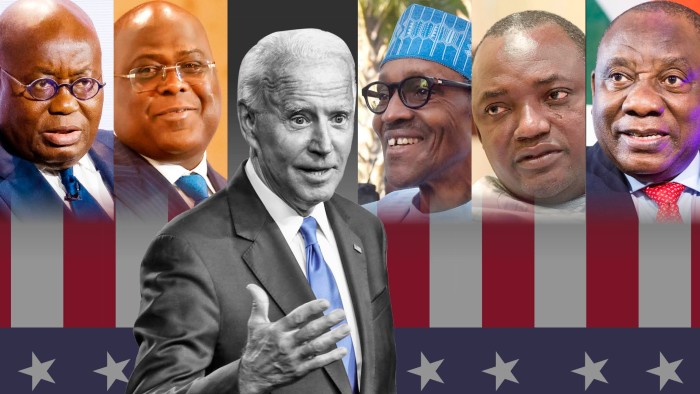Joe Biden has a chance to reshape America’s relationship with Africa

Simply sign up to the US foreign policy myFT Digest -- delivered directly to your inbox.
The writer is the CEO of The Africa Center
Secretary of state Antony Blinken’s current blitz through Kenya, Nigeria and Senegal is a welcome start to President Joe Biden’s rejuvenated Africa strategy. While the withdrawal from Afghanistan has engulfed the White House, Biden should not forget the importance of US commitments to other parts of the world.
A new focus on trade and investment in Africa could be a foreign-policy success. Prioritising a presidential visit there would make a strong statement of intent in resetting US relations with the continent. A thoughtfully planned tour would allow Biden to emphasise his commitment to democracy and the rule of law, and build partnerships to tackle the climate crisis affecting African countries that have contributed very little to its making.
The US and sub-Saharan Africa are entwined by history. The exploited labour of enslaved Africans has without doubt contributed to America’s economic dominance today. Their descendants overwhelmingly helped propel Biden to the presidency.
Franklin D Roosevelt was the first sitting US president to visit sub-Saharan Africa, in 1943, when he met with President Edwin Barclay of Liberia — significant because the US was still gripped by white supremacist Jim Crow laws. Thirty-five years later, Jimmy Carter visited Nigeria.
Every US president since George HW Bush — with the exception of Donald Trump — has followed suit, albeit with low frequency and light agendas. Trump’s snub, coupled with travel bans and xenophobic rhetoric, were provocations to a region that generally has very high favourability ratings for the US.
Biden, who visited Kenya and South Africa as vice-president, did well to swiftly reverse Trump’s discriminatory travel policy, but showing up in person would truly cement partnerships.
First on the list could be Ghana, which used its Year of Return campaign to foster a modern relationship with the African diaspora at a time of increasing racial tensions in the US. Biden’s presence could expand opportunities for its coronavirus-hit tourism sector while emphasising a key pillar of the Prosper Africa initiative — diaspora-led trade and investment.
To achieve his mission of supporting democracy and the rule of law, Biden may encounter common ground in South Africa, where President Cyril Ramaphosa similarly finds himself tasked with restoring confidence in government in the wake of a charismatic strongman who sought to bend or break state institutions for personal gain.
The Gambia, preparing for its second free and fair national elections since ousting longtime dictator Yahya Jammeh, is ripe for a solidarity visit. If Biden eschews the lecturing language of western leaders past and focuses on the shared struggle to solidify democratic governance, the message against authoritarianism would ring loud and clear.
His boldest move could be making history as the first US president to visit the Democratic Republic of Congo, particularly in the wake of November’s COP26 climate change summit, where he could acknowledge the responsibility the US bears due to its outsized carbon footprint.
US policymakers may want to avoid such a complicated country, but the DRC’s potential for addressing the climate crisis should not be overlooked. With the world’s largest coltan reserves and significant cobalt and lithium deposits, it is a crucial player in the so-called fourth industrial revolution, the development of battery technology and shift away from fossil fuels. The Congo River basin rainforest is the world’s second largest carbon sink after the Amazon.
Strategic partnerships, such as incentivising locally-led democratic reforms with increased US investment in more equitable mining and processing, could allow Congolese people to build a fairer society. It might also help the US topple China’s dominance as this region’s preferred trading partner.
And while Nigeria has its own political and security issues, its population of 212m people is too big a market to ignore. A revitalised Power Africa programme that highlights how Nigeria could benefit from ramped up renewable and fossil fuel energy production could be key for a mutually beneficial and climate-forward trade deal.
With such pressing issues at home, it may be hard for Biden to justify travel abroad, but re-establishing America’s tarnished leadership in the world means restoring ties with international allies. African countries can play as significant a role in America’s future as they did in its past, only this time as empowered partners.
Comments